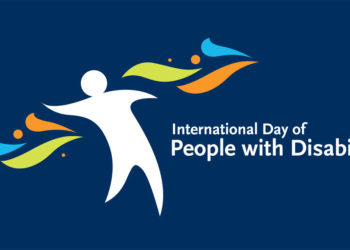Brush off the clouds and cheer up,
Put on a happy face.
Take off the gloomy mask of tragedy,
It’s not your style
You’ll look so good that you’ll be glad
Ya’ decide to smile!— Put on a Happy Face
The alarm buzzes in the early morning and the sun isn’t even up yet. I get up, get dressed, feed the kids, drive to work, and…………I’m there, in the office, in a chair, in front of my computer, but there’s a cloud above my head. I can hear voices of people talking around me, I smile mechanically when asked how I’m doing and say, “I’m fine”, but I’m really not. I’m worried about my kids, I’m worried about having enough food for them, I’m worried about getting to and from daycare with construction traffic, and I’m just exhausted. I’ve been trying to “put on a happy face” since my youngest daughter was born and I…….just…….can’t.
This was how I felt for about a year after my daughter was born. I had postpartum depression and was hiding it as best I could from the world. I passed the mental health screening my doctor gave me, got the green light to go back to work, and there I was — at work, trying to be a productive employee contributing to the team. But there was a depressive cloud sitting on my shoulder every single day, making me feel less like a person and more like a robot going through the motions. It’s not that people at work weren’t supportive — we had (and continue to have) a great team, but I just never felt like I could name what was going on, let alone share it with my co-workers. Having a baby is a beautiful experience, so why wasn’t I happier?
The depression crept up gradually after I lost a child in the year before my daughter was born, because I had never really dealt with the grief of that loss. I went from losing a child to becoming pregnant with my next in the span of half a year, and that grief and heaviness carried over into my pregnancy. I was jumpy and paranoid about every little thing and, after my daughter was born, I was constantly terrified I would lose her too. To be honest, there are days where I still feel that terror so keenly in my bones that I can barely stand it. I have to mentally shake it off and realize that she’s fine and I don’t have to worry that much.
Those days of postpartum depression are almost a blur to me, I can’t remember a lot of what happened, but I do remember feeling numb and feeling angry — angry at the world for not understanding the pain I was going through, not helping me, and mad at myself. My husband said he knew something was wrong with me when he would take me to bookstores and I’d wander around and then say, “I didn’t find anything I wanted to read.” And I didn’t. For over a year, I barely touched a book and, trust me, that is highly unusual for this bookworm. I didn’t want to engage in work activities, and even the simplest request felt like a huge stone to move.
I didn’t really break through the depression cloud until I joined my workplace Employee Activity Committee. I volunteered to handle the yearly Thanksgiving food drive, because my Grandmother had worked in her community’s food bank for years and I wanted to do something she would be proud of. I put up flyers for the food drive, laid out boxes, and even had one at my desk, forcing me to interact with people after closing myself off for so long. On the day that I had to take the food to the food bank, it was a complete disaster. I didn’t know where to go, I got conflicting answers from people, the boxes were super heavy (pro tip: always put out more and smaller boxes!), and I was super stressed because I needed to get back to work to pump milk for my daughter. Eventually, after many calls to the food bank and a call to my husband sobbing because I didn’t know where I was going, I found the location and dropped off the donations. I recall stepping out of the building on a warm sunny afternoon and noticing a used bookstore a few doors down. I went in and bought an old Beverly Clearly book I had loved as a child, and I read my first book in a year that night.
The fog lifted that day and I started getting better, but I realized that we, as a society, have very few resources to help people deal with grief. In 1969, Elizabeth Kubler Ross introduced the five stages of grief — a guideline for what people commonly go through when dealing with grief. But despite a very basic understanding of the stages, it hasn’t helped equip us with how to really talk to someone in that situation. We tiptoe around each other, hoping that we won’t say the wrong thing and cause someone grieving to snap. We act largely the same when someone is depressed because we are so scared of upsetting them and being the cause of a suicide. It can be hard to even see depression because someone can “put on that happy face” and mask what is really going on in their mind. What if we had a magic mirror that would let us see someone’s grief, the sadness, the hurt, the anger, and all of those other uncomfortable feelings? What could we do then?
First off, we need to normalize the conversations around grief and depression. When I was growing up, I was taught that there were topics you just didn’t discuss in polite company (as my Grandmother put it), but not having those conversations makes it harder for the person going through it. They are scared to tell you how they really feel, because we all want to be liked and we’re scared that, if people knew how we really felt and how we really were doing, they’d never talk to us again. So, we need to normalize the conversation, and let people know that it’s ok to 1) have those feelings and 2) express them. Companies can do that by holding events during Mental Health Awareness Month, bringing in speakers to discuss these topics, and advising people on what they can and cannot say in the workplace. Rules have been changing rapidly in the past 20-30 years regarding what is appropriate and, in a multi-generational workplace, it would be beneficial for HR Departments to clearly outline the current recommendations for workplace communications.
For supervisors, this is a tough spot to be in. How can you support employees who may have an undiagnosed and unseen mental illness? This is where I wish I had a better answer, because I know I tried my best to keep my postpartum depression from my work colleagues; I may have even denied it had my supervisor said that they thought something was amiss. After being a supervisor for a few years now, I’ve tried to take what I’ve learned from my experience and pass it on to my employees. I’ve tried to make sure they have a flexible schedule, working with them to break down large tasks into easier bite-sized pieces, and setting shorter deadlines. I also try to focus on the positive contributions they have made. I know, after going through this, that depression can make people very self-critical and it helps to have a supervisor tell you what you are doing well instead of focusing on areas where you’ve made mistakes. And finally, just make yourself available. When we were working in the office, I had a tissue box and a teddy bear available if anyone needed it and, even while I’m remote, I try to make myself available if someone needs to talk.
So, how am I feeling these days? If I’m honest, some days are still an uphill battle. The postpartum depression is largely gone, but it takes very little to trigger another depressive episode — it’s the cloud that is always there, on the edges of my brain, just waiting for an opportunity. Thankfully, I’ve learned a lot about depression, thanks to more courageous people, and I try to tell people if I’m upset about something or if I’m just having an off day. We all have our off days, but sometimes it’s a sign of a bigger issue, so give your co-worker a little more compassion, be there for them if they need to talk, and also give them space to be themselves, dark clouds and all.
Discussion
14 Thoughts on "Mental Health Awareness Mondays — Put on a Happy Face: A Personal Reflection of Grief and Loss in the Workplace"
Thank you so much for sharing your experience and thoughts, Holly. I have shared with my colleagues as this is so vital to be aware of.
This is such a perfect description of what it is like. I had PTSD after the birth of my child and continued to put a brave face on things for two years until things fell apart. I’ve moved jobs now, as I found my old workplace was less than supportive of my mental health needs. I feel much more able to be open about my feelings now.
Holly, what an incredible post. Thank you for your willingness to be vulnerable and share your story with the community. It is so very important to normalize talking about things just not being okay.
As a related aside on the topic of hard times – there is a podcast called “Terrible, Thanks for Asking” that I highly recommend.
Brooke, thank you for the recommendation – I’ll definitely give this a listen!
Holly, thank you for sharing your journey. It is something we should destigmatize and talk about.
Holly, thank you so much for sharing your story! Such an important conversation.
Thank you so much for sharing your experience!
thank you for sharing your journey.
Holly, wow. This post blew me away – thank you for sharing so eloquently and transparently. I appreciate your honesty. I have four kids and have felt all of these feelings so intensely. The difference is you were brave enough to share so publicly. Please understand that this piece impacted me so deeply and that it will be a gift to many for countless years to come. I appreciate you.
This series is so important, I appreciate it very much. Holly, thank you for helping us understand your journey and struggles.
Thank you so very much for sharing this. Many of us can relate to these feelings and it helps so much to know we are not alone.
Hugs to you, Holly <3 – thank you for your vulnerability. When you feel like your world stops, but life keeps going on as if nothing's changed, it's so difficult and confusing.
I so appreciate this post. PPD is awful, but it’s so common. New parents need much, much more support in those first few months than they usually get. I’m also so sorry for your loss, but thank you so much for sharing. <3
Post partum depression is so real and so misunderstood…you have shed a light that will help many…



